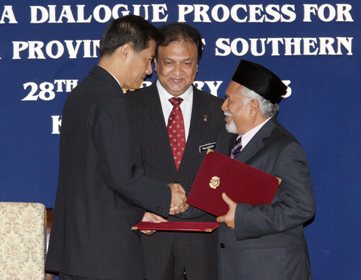Doubt over peace talk between the government and the “old guard” separatists
March 13 of every year marks the founding day of the separatist organization Barisan Revolusi Nasional (BRN) or Barisan Revolusi Nasional Melayu Patani as it was officially called.

As has been practiced for the past several years, security was beefed up on Wednesday March 13 as a precaution against possible step-up of violence in the three southernmost provinces by the militant groups. The day has passed without major violent incidents much to the relief of the security forces and BRN core leaders.
The scale-down in violence could be a sign from the BRN that the organization is serious about talking peace with the Thai government and that it has wielded influence over some if not all the militant groups in the restive region.
The BRN was first established on March 13, 1960 by ustaz (Muslim religious teacher) Abdul Karim Hassan. Eight years afterward, he formed a fighting force and two years later, young Muslims who joined the organization were sent to study in Indonesia.
During 70s, BRN underwent restructuring divided into three wings: BRN Ulama which is the religious wing; BRN Congress which is the military wing and BRN Coordinate, the political wing.
Some sources however noted that the restructuring actually stemmed from internal fighting. Nevertheless, Abdul Karim Hassan still remained the BRN leader during the 80s and the BRN Congress was eventually disbanded.
Thai security sources said that the BRN Coordinate underwent another major structural change with the creation of the so-called Malayu Revolutionary Organisation which is divided into three bodies – the policy-making body; the mass body and the military.
The "people’s war" was unleashed by the Malayu Revolutionary Organisation on January 4, 2004 when armed militants attacked an armoury in Narathiwat and made of with more than 400 weapons, mostly M16 assault rifles. The incident marked the official start of insurgency war by a new generation of militants in the deep South.
The new breed of warriors appear to be acting on their own with their firm belief in support of a separate homeland and against the Thai state and not associated with any separatist organizations such as BRN or Pulo (Pattani United Liberation Organisation).
Maroso Chantharavadi, the militant leader who led the failed attack of a Marines camp in Narathiwat in February in which 16 militants were killed including Maroso himself, is a clear example of a free-spirited militant who was not associated with any separatist organizations.
Hence, the lingering doubt about the peace dialogue process between the Thai government and the BRN old guards - whether it will ever bring about peace in the region?
